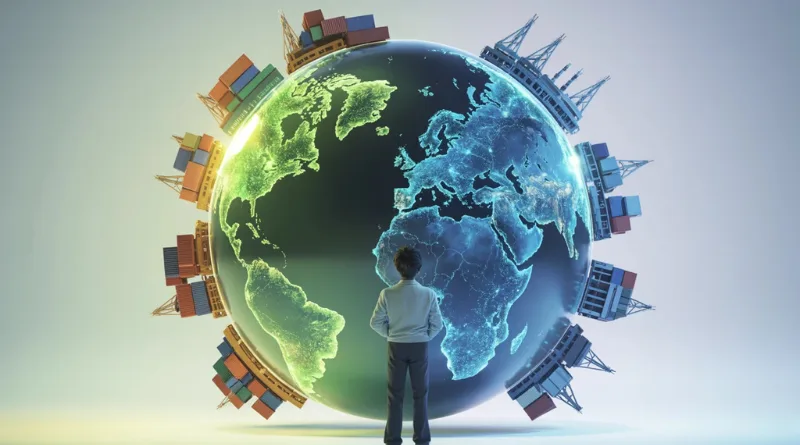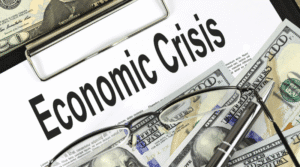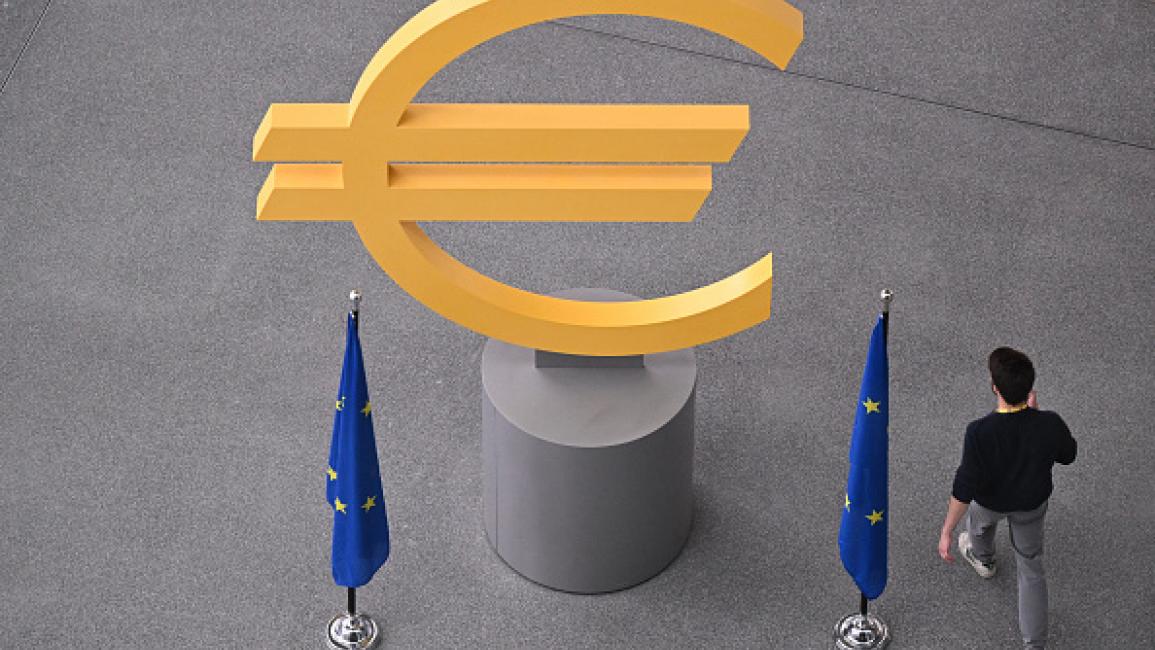Has the global economic collapse already begun? What does it mean for you?

The global economy faces headwinds and extreme volatility in 2025. As global markets begin to recover from the effects of the COVID-19 pandemic, new challenges have emerged that threaten their stability. Several factors contribute to this turbulent landscape, most notably geopolitical conflicts that are reshaping trade alliances and impacting commodity prices.
Additionally, tight monetary policies pursued by major economic powers, such as the United States, to combat inflation are leading to higher interest rates globally. This increase places a significant burden on developing countries, exacerbating their sovereign debt crises and threatening their financial stability.
All of these factors together portend a slowdown in global economic growth and could push some economies into stagflation, where rising prices coincide with a decline in economic activity. This situation will impact the lives of ordinary people through increased living costs, particularly commodity prices, and reduced job opportunities.
Join us to explore the dimensions of these economic fluctuations and how they will impact our daily lives around the world.
Factors that portend a global economic crisis and its potential repercussions
With increasing talk of potential global economic crises in 2025, it becomes essential to understand the factors that could lead to and exacerbate these crises, how countries and individuals might confront them, and their direct impact on people’s daily lives.
Factors that could lead to a global economic crisis
There are several factors that could lead to a global economic crisis in 2025, most notably:
Geopolitical tensions:
Regional and international conflicts and disputes directly impact global supply chains, energy prices, especially oil and gas, and commodity prices such as grains and metals. This rise in costs leads to global inflation and reduces the purchasing power of individuals and businesses.
Tight monetary policies:
To combat inflation, central banks in major economies, such as the US Federal Reserve, tend to raise interest rates. Although this aims to curb inflation, it increases the cost of borrowing for businesses and governments, slowing investment and economic growth, and increasing the risk of recession.
Sovereign Debt Crisis:
Many countries, particularly developing countries, are suffering from high levels of debt. As interest rates rise, repaying these debts becomes more difficult, potentially leading to defaults in some countries and creating global financial instability.
Supply Chain Disruptions:
Despite relative recovery following the COVID-19 pandemic, supply chains remain vulnerable to disruptions due to geopolitical events or natural disasters, affecting the availability of goods and driving up prices.
Climate Change:
Increasing natural disasters caused by climate change are impacting agriculture, infrastructure, and even industrial sectors, leading to significant economic losses and increased pressure on resources.
Slowing Growth in Major Economies:
If growth slows in major economies such as the United States, China, and the Eurozone, it negatively impacts global trade and investment, which in turn impacts smaller economies that rely on these markets.
How to Confront the Global Economic Crisis
Confronting the economic crisis requires coordinated efforts at multiple levels:

The Responsibilities of States and Governments:
· Expansionary Fiscal Policies: Increasing government spending on infrastructure and development projects to create jobs and stimulate demand, or reducing taxes to encourage consumption and investment.
· Agile Monetary Policies: Central banks must strike a balance between combating inflation and supporting growth. This may include lowering interest rates if the recession worsens, or resorting to quantitative easing (QE), i.e., injecting liquidity into the markets.
· Debt Management: Negotiating debt rescheduling, seeking alternative financing sources, or taking measures to reduce public debt.
· Promoting Local Industries: Supporting and localizing industry to reduce dependence on imports and increase exports, which enhances self-sufficiency and creates jobs.
· Diversifying Income Sources: Reducing dependence on a single sector, such as oil, and diversifying the economy to include new sectors such as technology, tourism, and renewable energy.
· Improving the Business Climate: Simplifying procedures, providing incentives for local and foreign investors, and combating corruption to increase investment and create jobs.
· International cooperation: Coordinating with international organizations and other countries to develop joint solutions to global challenges such as debt and inflation.
· Supporting the most vulnerable: Providing social safety nets, such as cash support programs or subsidies, to protect low-income families from the repercussions of the crisis.
Individual responsibility:
· Personal budget management: Developing a precise budget to track income and expenditures, prioritizing spending, and reducing unnecessary expenses.
· Creating an emergency fund: Saving an amount of money to cover living expenses for at least 3 to 6 months, to address unforeseen circumstances such as job loss or health crises.
· Debt reduction: Focus on paying off high-interest debt first and avoiding unnecessary borrowing.
· Diversifying income sources: Seeking additional job opportunities or developing new skills to increase your chances of earning additional income.
· Investing cautiously: During times of crisis, markets can be volatile, so carefully consider investment options and avoid high-risk investments.
· Financial literacy: Monitoring economic news and understanding its impact on personal financial decisions.
· Mental health: Economic crises can increase stress and anxiety, so it’s important to take care of your mental health and seek support when needed.
How does the crisis affect the daily lives of ordinary citizens?
The economic crisis has a direct and tangible impact on the lives of ordinary citizens. These effects are manifested in several aspects:
Rising Cost of Living
· Food: Prices of basic foodstuffs rise due to supply chain disruptions, inflation, or currency fluctuations.
· Energy: Electricity, gas, and fuel bills rise, increasing the financial burden on families.
· Rent and Housing: Rental costs may rise, making it more difficult to purchase property.
· Deteriorating Purchasing Power: Even with stable salaries, rising prices mean that the same amount of money buys fewer goods and services, leading to a lower standard of living.
· Job Loss and Unemployment: Companies may resort to laying off workers to cut costs during economic downturns, leading to increased unemployment rates and difficulty finding new jobs.
· Difficulty Obtaining Credit: As interest rates rise, personal loans, home loans, and car loans become more expensive and less available, limiting individuals’ ability to achieve their financial goals.
· Impact on Savings and Pensions: The value of savings and investment assets, such as stocks and bonds, may be affected by market fluctuations, threatening the financial stability of retirees or those planning for retirement.
· Deterioration in Essential Services: Governments may be forced to cut spending on public services, such as health, education, and transportation, affecting the quality of these services provided to citizens.
· Increased Stress and Anxiety: Financial and economic pressures can deteriorate the mental health of individuals and families, increasing levels of stress and anxiety.
· Lifestyle Changes: Individuals may be forced to alter their consumption habits, seek cheaper alternatives, or forgo some luxuries to cover basic living expenses.
In Conclusion:
Global economic crises are complex and multifaceted phenomena that require a deep understanding of their causes and effects. Early preparation, whether at the level of government policies or individual actions, plays a crucial role in mitigating the severity of these crises and ensuring that societies can overcome them with minimal losses.
Also read:
l should-you-buy-bitcoin-now-or-is-it-too-late-in-2025
l a-leak-reveals-the-iphone-17s-battery-capacity-predicting-radical-changes
l samsung-unveils-its-thinnest-phone-the-galaxy-z-fold-7




